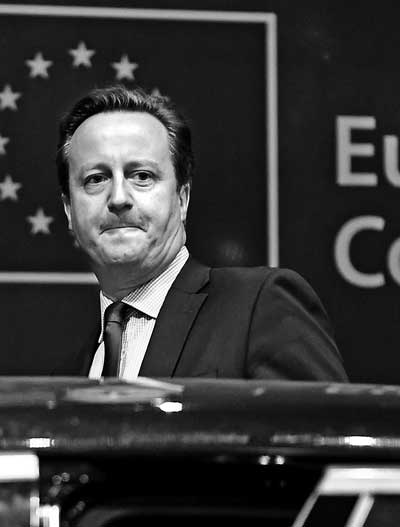20 Feb 2016 - {{hitsCtrl.values.hits}}
 European leaders have a lot of work to do at a summit in Brussels to reach a deal to prevent Britain becoming the first country to crash out of the bloc, EU president Donald Tusk warned yesterday.
European leaders have a lot of work to do at a summit in Brussels to reach a deal to prevent Britain becoming the first country to crash out of the bloc, EU president Donald Tusk warned yesterday.
British Prime Minister David Cameron urged his counterparts on day one of the tense two-day meeting to reach a “credible” reform deal that would allow him to hold a referendum on EU membership in June.
But in the face of concerns from France and eastern European countries, Tusk warned that the initial round of talks had left much more to do to reach an agreement to rule out a so-called “Brexit”. “For now I can only say that we have made some progress but a lot needs to be done,” Tusk told a brief press conference, before rushing off to a fresh round of overnight bilateral talks with key leaders. German Chancellor Angela Merkel appeared largely supportive of Cameron’s stance as the EU seeks to maintain unity so it can focus on the larger worry of the migration crisis.
“The agreement’s not easy to take for many but good will is there. We are ready to compromise because advantages are higher than disadvantages when there is Brexit,” Merkel told reporters.
But Irish Prime Minister Enda Kenny warned: “I think it may be longer than they think.”
‘Live and let live’
Cameron, under pressure from eurosceptics in his centre-right Conservative Party and a hostile right-wing press, says he will back a ‘Yes’ vote in the referendum if he can cut a deal in Brussels.
Failing that, he has said all options are open, refusing to rule out the possibility that Britain could become the first country to leave the EU in its more than 60-year history.
With the clock ticking, Tusk held face-to-face talks with Cameron and European Commission President Jean-Claude Juncker late into the night in a bid to overcome the final hurdles to a deal.
Tusk also met French President Francois Hollande, Belgian Prime Minister Charles Michel and Czech Prime Minister Bohuslav Sobotka.
Hollande has reservations about Cameron’s demands for safeguards for countries that do not use the euro currency, while sources said Michel was “very determined” in his objections to calls to exclude Britain from the EU’s goal of “ever closer union”.
The Czech premier meanwhile leads a group of four Eastern European countries that object to Cameron’s request for a limit to welfare benefit payments for EU migrants working in Britain for four years.
In an impassioned speech to his colleagues, as the summit began, Cameron called for a “sort of live and let live” approach to reach a deal.
He urged them to secure “a package that is credible with the British people”, adding that the issue of Britain’s place in Europe “has been allowed to fester for too long” and that there was now a chance “to settle this issue for a generation”.
‘No right to veto’
Three years after Cameron announced he wanted to reset Britain’s ties with the European Union, the talks are going down to the wire with highly technical disagreements in all key areas.
But the principle behind them goes to the heart of the EU -- the British vision of a loose trade union versus the post-war European federal ideal -- and tests the EU as it faces a colossal influx of migrants fleeing war in the Middle East.
Hollande said earlier that he wanted an agreement and that it was “possible” -- but warned that “no country can have the right to veto” eurozone states.
The issue raises particularly sensitive questions around banking regulation as Britain is home to the City of London, one of the world’s leading financial centres. Meanwhile Brussels has offered an “emergency brake” to limit benefits for new migrants for four years, which Britain could invoke if its welfare system is overwhelmed by the inflow of workers, as it believes it has been.
AFP
29 Nov 2024 29 Nov 2024
29 Nov 2024 29 Nov 2024
29 Nov 2024 29 Nov 2024
29 Nov 2024 29 Nov 2024
29 Nov 2024 29 Nov 2024